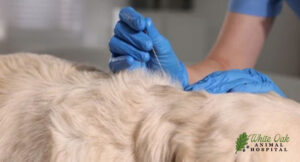Acupuncture and herbal therapies, integral components of Traditional Chinese Veterinary Medicine (TCVM), have transcended cultural boundaries, emerging as significant modalities in contemporary veterinary practice. Historically rooted in ancient Chinese medicine, these practices offer a holistic approach to pet healthcare.

In 2003, the World Health Organization recognized acupuncture’s efficacy in treating various symptoms and diseases, highlighting its scientific validity. Similarly, herbal therapies have gained traction for their ability to complement conventional treatments, often enhancing recovery and managing disease progression.
Understanding Acupuncture and Herbal Therapies
Acupuncture and herbal therapies, critical components of Traditional Chinese Veterinary Medicine (TCVM), have evolved from ancient Chinese practices to modern veterinary care. Acupuncture involves inserting fine needles into specific body points to restore energy balance and promote healing. It’s proven effective in various pet ailments, notably in a 2010 study showing significant improvement in dogs with neurological issues.

They are now integrated with conventional treatments, offering pet owners effective, low-risk options for diverse conditions like nerve malfunctions and gastrointestinal disorders. This convergence of ancient wisdom and modern veterinary science underscores a commitment to holistic pet health.
The Mechanisms Behind the Treatments
Acupuncture, a core practice in Traditional Chinese Veterinary Medicine, stimulates specific body points to balance energy flow. In pets, this involves inserting ultra-thin needles into over 400 acupoints, each linked to specific internal functions and organs. This process, scientifically backed by studies like Kim’s 2009 research, triggers physiological changes such as increased blood flow and endorphin release, effectively aiding pain relief, nerve healing, and overall health improvement.

Together, acupuncture and herbal therapies offer a holistic approach, addressing the root causes of diseases and promoting recovery through natural, body-friendly mechanisms.
A Journey Through History
The history of acupuncture and herbal therapies is rich and deep-rooted, particularly within Traditional Chinese Veterinary Medicine (TCVM). These practices, initially developed for humans, have been successfully adapted for animals, significantly enhancing their quality of life. Historical figures like Zhao Fu and Bo Le, who practiced veterinary acupuncture from 947 to 928 BC, laid the foundation for these therapeutic techniques. Over the centuries, these practices have evolved, integrating with modern veterinary science.

Conditions Treated with Acupuncture and Herbal Therapies

These therapies provide anti-inflammatory benefits and improve overall vitality for dermatological issues and chronic conditions like kidney disease, especially in older pets. Acupuncture and herbal treatments are not just for addressing existing ailments but also for preventive care and enhancing performance.
In practical settings, these therapies have shown significant health improvements in pets, particularly in cases unresponsive to traditional methods. The primary advantages include minimal side effects, efficient metabolic waste elimination, and improved circulation. This positions acupuncture and herbal therapies as valuable, safe complements to conventional veterinary care, offering a holistic path to maintaining and restoring pet health.
Safety and Risk Management
Acupuncture and herbal therapies are generally safe for pets, with minimal risk of adverse effects. Acupuncture, involving thin, sterile needle insertion into specific body points, is well-tolerated by most animals, often inducing relaxation. Techniques like electroacupuncture and moxibustion enhance its therapeutic impact. Side effects are rare, typically limited to mild discomfort or temporary drowsiness post-treatment.
To ensure the utmost safety and effectiveness, certified veterinary acupuncturists must administer these treatments. These professionals are extensively trained in acupuncture’s history, patient diagnosis, and therapy specifics. Qualified veterinarians should also oversee herbal therapies to avoid negative interactions with the pet’s overall health regimen.

Choosing the Right Practitioner
Selecting a qualified practitioner for acupuncture and herbal therapies is crucial in ensuring safe and effective treatment for your pet. When choosing a specialist, the primary criteria should include certifications and specialized training. Look for practitioners who are certified veterinary acupuncturists, as this indicates comprehensive training in both the theory and practical application of acupuncture. Additionally, experience in herbal therapies is essential, ideally with a background in veterinary medicine. Confirming these qualifications ensures that the practitioner understands the intricacies of these therapies and the specific health needs of animals. Choosing a practitioner with this specialized expertise guarantees that your pet receives the best care under acupuncture and herbal medicines.
At White Oak, you’ll find an unparalleled commitment to integrative options, including Traditional Chinese Veterinary Medicine (TCVM), not readily available elsewhere. With his 28+ years of experience and a track record of treating over 6,000 pets, Dr. Casey Damron is a testament to these treatments’ effectiveness and reliability.

Incorporating acupuncture and herbal therapies into your pet’s healthcare regime under the guidance of experienced professionals like Dr. Damron can significantly enhance their quality of life, offering safe and effective alternatives to conventional treatments.
Frequently Asked Questions
What conditions can acupuncture and herbal therapies treat in pets?
Acupuncture and herbal therapies are versatile, addressing various pet health issues. This includes arthritis, neurological disorders, gastrointestinal problems, respiratory conditions, skin issues, and chronic diseases like kidney disease. They also benefit pain management, boost performance, and preventive health care.
Are acupuncture and herbal therapies safe for all pets?
Generally, acupuncture and herbal therapies are safe for most pets. However, each pet’s health condition is unique, so it’s vital to consult with a certified veterinary acupuncturist or a veterinarian skilled in herbal therapies to ensure these treatments are appropriate for your pet.
How does acupuncture work, and does it cause pain to pets?
Acupuncture involves inserting fine needles into specific points on the pet’s body, which is typically well-tolerated. Most pets experience minimal discomfort, with many showing signs of relaxation during the treatment.
What qualifications should I look for in veterinary acupuncture and herbal therapy practitioners?
When selecting a practitioner, ensure they are a certified veterinary acupuncturist, reflecting extensive training in acupuncture. For herbal therapies, the veterinarian should have specific training and experience in herbal medicine, preferably with a background in veterinary science.
Can acupuncture and herbal therapies be used alongside conventional veterinary treatments?
Yes, acupuncture and herbal therapies can seamlessly integrate with conventional veterinary treatments. They often enhance recovery and assist in managing various conditions. However, combining these treatments should be done under professional guidance to ensure safety and effectiveness for your pet.
Related Posts
-
Book an Herbal Medicine Consultation to Discover Solutions for Your Pet | Herbal Medicine for Pets
Herbal medicine consultations are an excellent option for pet parents who have specific questions about…
-
Best Dog Cushing’s Herbal Remedies
Dog Cushing’s herbal remedies may benefit your pet. Canine Cushing’s disease is also known as…
-
Herbal Supplements For An Aging Dog Losing Balance
It's hard to watch an aging dog losing balance. They may also experience weakness, shortness…
-
Herbal Help for the Timid Rescue Dog
A timid rescue dog often experiences emotional struggles. In fact, rescue pets manifest emotional challenges…









